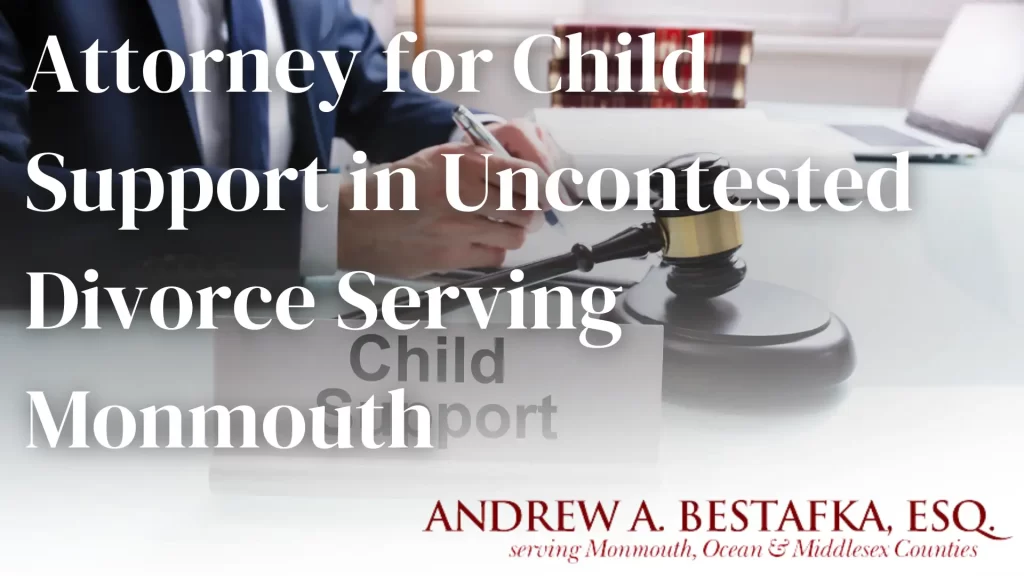
If you and your spouse have agreed to enter into an uncontested divorce and children are involved, you are likely most concerned about child support issues. But the anxiety about how to meet the financial obligations of caring for your offspring after divorce can be greatly diminished if you have the best legal representation you can get. Call (732) 898-2378 for a free consultation with a Monmouth uncontested divorce attorney from Law Office of Andrew A. Bestafka, Esq..
Why Hire Law Office of Andrew A. Bestafka, Esq.?

Andrew A. Bestafka, Esq., has been successfully handling a full range of family law cases for more than a decade in a cost-efficient and compassionate way. This highly respected lawyer will guide you through every aspect of your uncontested divorce, including the all-important child-related ones.
Overall, uncontested divorces result in much less animosity between the divorcing spouses, in part because the process is designed to be collaborative and streamlined, not combative. And it will be when you work with Attorney Bestafka. A New Jersey native, Attorney Bestafka has achieved a superb 10.0 rating with Avvo, an organization that evaluates the professionalism and effectiveness of lawyers. In 2015, Law Office of Andrew A. Bestafka, Esq. was named one of New Jersey’s top ten firms by the American Institute of Family Law Attorneys. Our legal team will help you to work out every issue with your spouse in a timely and amicable manner.
At What Point in an Uncontested Divorce Process Are Child Support Payments Decided Upon?
 Before you and your spouse can work out a child support agreement, the details of the custody arrangement must be decided. There are four types of custody arrangements that are possible after a divorce or legal separation in New Jersey:
Before you and your spouse can work out a child support agreement, the details of the custody arrangement must be decided. There are four types of custody arrangements that are possible after a divorce or legal separation in New Jersey:
- Physical custody: The parent with whom the child or children will live has physical custody. It can be shared.
- Legal custody: The parent who has legal custody makes the decisions that involve the child’s/children’s physical, educational, and emotional welfare. This responsibility, too, can be shared.
- Sole custody: A restriction on taking part in at least one aspect of the custody arrangement is in place for one of the parents.
- Joint custody: Both parents take part in at least one portion of the custody arrangement.
There is also the option of a shared legal and/or physical custody arrangement. The plusses and negatives of such a scenario will be carefully weighed by the judge and the parties involved in order to come to a sound decision.
How Is the Amount of the Child Support Payment Calculated?
After the child custody and visitation arrangements are made, both spouses’ finances come into play to calculate a realistic amount of child support. The goal is to establish a budget that covers all the expenses that impact the care of the child/children involved. It is paid monthly.
In New Jersey, several types of income sources and liabilities are used to determine the amount of the payment:
- Bank checking, savings, and money market accounts
- IRAs, retirement accounts, and 401Ks
- Pensions
- Business holdings
- Stocks and bonds
- Household items
- Spouses’ earnings
- Child’s/children’s earnings
- Antiques and collectibles
- Home equity and mortgage payments
- Medical costs
- Leases and loans on vehicles
- College loans
- Tuition payments
- Credit card payments
The court has provided guidelines that can be used to calculate the amount of child support. The guidelines take into account not only the parties’ income, but the health insurance expenses, extraordinary expenses, variable expenses, and the number of nights the child spends with each parent, among other factors.
Is the Initial Child Support Payment Amount Permanent?
In New Jersey, when a child reaches 19 years of age or when they move out on their own, the child support payment ends. However, for the duration of the time that the parents support the child/children, a modification to the amount of the child support payment may be made if one party, due to changes in their circumstances, files a motion in court. The motion can be either to supplement or to lower the amount.
- An example of a reason to file a motion to modify the child support payment downward is if one parent can no longer work due to medical issues.
- An example of a reason to modify the child support payment upward is if a child becomes permanently disabled.
- If a child increases the time they spend with the other parent, the child support payment may change.
Legal Mandates Regarding Child Support
There are some legal requirements that may affect the amount of the initial child support payment in addition to a change in circumstances:
- Adjustments to the cost of living: New Jersey law states that every two years, each child’s support allotment must be adjusted. The parties must receive notification of the adjustment, and they have 30 days to argue against it.
- A cost-of-living adjustment does not interfere with a party’s decision to file a change in circumstances motion.
What Are the Requirements for Seeking an Uncontested Divorce?
While you and your spouse may be quite willing to work out all of the decisions related to getting an uncontested divorce on your own, many people find it beneficial to obtain the legal services of an established family law firm to help them get through the process.
Either way, to qualify for an uncontested divorce in New Jersey, you and your spouse must agree on all of the issues related to your case, including:
- An equitable portion of all assets and debts for each party
- Alimony payments
- Child custody arrangements
- Child support payments
- A legal reason for divorce; for example, irreconcilable differences
Additionally, at least one spouse must reside in New Jersey for a minimum of one year prior to filing divorce papers.
Call Law Office of Andrew A. Bestafka, Esq. to Handle Your Uncontested Divorce with Child Support
As you start the uncontested divorce process, your main concern is obtaining the most beneficial outcome for your family. Fortunately, you need to look no further than Law Office of Andrew A. Bestafka, Esq.. Our experienced legal team will prepare all the necessary paperwork to present to the court, including the documents that are crucial to your offspring’s financial support.
Andrew A. Bestafka is a New Jersey native who will expertly guide you through this emotional time. Contact our firm at (732) 898-2378 for a free and confidential consultation. You can also fill out our online contact form, email, or chat with us online. Your family’s well-being is at stake.
